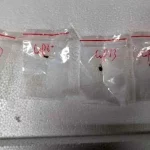In a case that has raised serious concerns about national security and agroterrorism, the FBI has arrested two Chinese nationals for allegedly smuggling a highly dangerous fungal pathogen into the United States. The accused, Yunqing Jian, 33, a researcher at the University of Michigan, and Zunyong Liu, 34, her boyfriend and fellow academic from China, are charged with bringing Fusarium graminearum—a fungus known to devastate staple crops—into the country without authorization.
Also Read: What Is Fusarium Graminearum, the Fungus Smuggled by The Chinese Into the US?
The arrests were announced by the FBI’s Detroit division in cooperation with U.S. Customs and Border Protection (CBP). Authorities say the smuggled fungus poses a direct threat to the U.S. food supply. It causes head blight, a disease that severely damages wheat, barley, maize, and rice, with global economic losses running into billions of dollars annually. Moreover, the fungus produces mycotoxins harmful to humans and livestock, capable of inducing vomiting, liver damage, and reproductive issues.
According to the U.S. Attorney’s Office for the Eastern District of Michigan, Jian and Liu intended to conduct unlicensed research with the pathogen at a University of Michigan laboratory, which was not cleared to handle such biohazards. Liu was intercepted at Detroit Metropolitan Airport in July 2024 when red plant material was discovered in his backpack. He was deported to China immediately, but Jian is believed to have already been working with the material prior to his arrival.
Investigators discovered messages indicating Jian’s ongoing work with the fungus and her loyalty to the Chinese Communist Party. She had reportedly received funding from the Chinese government for similar research in China. U.S. Attorney Jerome Gorgon Jr. stated that the incident represents a significant national security concern, pointing to the risks of foreign interference in American scientific institutions.
Jian was taken into custody on June 3 and appeared in court in Detroit. She is currently being held pending a bond hearing. Liu remains in China and is unlikely to face extradition due to the absence of a treaty between the two countries. The charges filed include conspiracy, smuggling, making false statements, and visa fraud.
FBI Director Kash Patel described the case as a “sobering reminder” of the threat posed by foreign agents targeting critical U.S. infrastructure such as agriculture. He praised the quick action of the FBI Detroit office and CBP in averting what could have been a major biosecurity breach.
The incident has reignited debate over the security of American research labs and the presence of foreign researchers in sensitive academic settings. This case also emerges amid escalating U.S.-China tensions, with visa restrictions and trade disputes fueling mistrust. The University of Michigan and the Chinese embassy in Washington, D.C., have yet to issue statements on the matter.
As the investigation continues, officials emphasize the urgent need for stronger safeguards in biological research and academic institutions to prevent future threats to the nation’s food and economic security.













